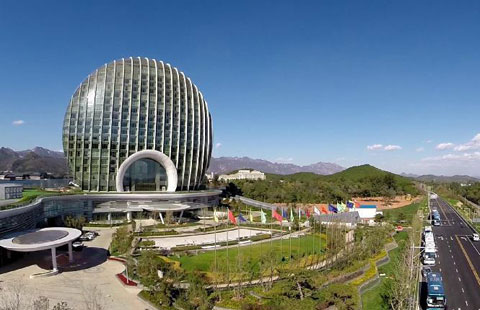
Service sectors take the helm in sailing city
Updated: 2014-05-14 07:06
By Xie Chuanjiao (China Daily)
|
||||||||||
Qingdao's service sectors have outpaced manufacturing and agriculture to become the major driving force of its economy.
Since 2011, the city's added value in the service industry has increased by an average of 11.1 percent each year and reached 401.28 billion yuan ($64.33 billion) in 2013. It accounted for 50.1 percent of the city's gross domestic product.
Tax revenue generated from service sectors accounted for 48.5 percent of the city's total and created 53 percent of employment in Qingdao.
 ?
?
|
The coastal city has its eye on the development of its modern service industry in areas of port services, tourism, finance and outsourcing. Photos provided to China Daily |
Industry upgrade
The development of the service sector is a key driver for Qingdao's industrial restructuring and upgrade.
The city's traditionally dominant service sectors like commerce circulation and transport are growing steadily while some emerging industries are picking up pace.
The added value in modern service sectors, including finance, tourism, creative, brokerage, scientific information and modern logistics, increased by 10 percent this year.
Int'l influence and port service

Foreign trade remains a significant part of Qingdao's service industry. Its trade volume in 2013 was $77.9 billion, accounting for one third of the province's total. A total of 13,000 companies in the city are involved in foreign trade.
Leading global service providers such as Microsoft, IBM, Jusco, 7-Eleven, Oracle, Walmart, KPMG, PWC, and Sheraton have invested in Qingdao and have played an important role in vitalizing the city's service sectors including port logistics, finance and insurance, commerce and tourism as well as service outsourcing.
As a major transportation hub, Qingdao Port has the largest number of routes in north China. The port created trade ties with more than 700 ports in 180 countries and regions. Its handling capacity in 2013 reached 458 million tons, which ranked it seventh highest in the world.
Tourism
Qingdao has been renowned as a popular tourist and health resort since the 1920s.
Its sandy beaches, European style architecture, well-preserved heritage and sacred Laoshan Mountains, which overlook the sea, attract tourists from around the world.
A total of 62 million tourists visited the city last year, generating 93 billion yuan worth of tourism revenue for Qingdao in 2013.
During the International Workers' Day holiday on May 1, the city welcomed 3.32 million people, up 25.2 percent from the same period last year.
Finance
As the city's overall economic strength grows quickly, financial sectors in the coastal city are also gaining momentum.
Qingdao built a comprehensive financial service system with a variety of banks, securities, futures trading, insurance agencies and other financial institutions.
The central government's decision earlier this year to pilot a financial reform zone featuring wealth management in Qingdao is expected to be a leap forward in its quest to become a finance hub.
To date there are 193 financial institutions operating in Qingdao, including 13 foreign invested banks, such as Standard Chartered, HSBC and Deutsche Bank. A complete financial industry chain that incorporates banking, insurance, securities, trust funds and financial institutions is well established.
In 2013, the city's overall deposit and loan amounts for domestic currency hit 114.183 trillion yuan and for foreign currency hit 96.424 trillion yuan. This was an increase of 16.3 percent and 11.7 percent respectively from 2012.
Outsourcing
The outsourcing industry is a new star among Qingdao's service sectors. In 2011, the city's outsourcing contracted amount reached $2.44 billion and the executed amount reached $1.71 billion, up 122.8 percent and 103.6 percent respectively. The offshore outsourcing contracted volume reached $2.33 billion and the executed amount hit $1.63 billion, which accounted for 41.3 percent of Shandong province's total.
The city sped up development of outsourcing parks. New parks include 80,000 square meters of office space at Huangdao's Optical Valley and 170,000 square meters at Laoshan's International Innovation Park. A further eight parks are under construction.
There are a total of 547 outsourcing companies in Qingdao, a whopping 40 percent growth from last year.
There are 30 specialized outsourcing training institutions in the city that provide training for more than 10,000 students.
In 2013, Qingdao was ranked second on the list of rising Chinese outsourcing cities, in an evaluation by Chnsourcing.com.
xiechuanjiao@chinadaily.com.cn









